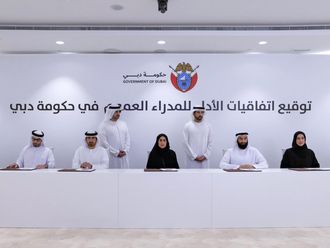
Dubai: Dubai Health Authority (DHA) is planning to make early cancer detection tests a part of coverage for the basic insurance package, a senior official has said.
The authority’s plans were presented on Thursday during a Dubai Executive Council (DEC) meeting, chaired by Shaikh Hamdan Bin Mohammad Bin Rashid Al Maktoum, Dubai Crown Prince and Chairman of DEC.
Shaikh Ahmad Bin Saeed Al Maktoum, President of Dubai Civil Aviation and Second Deputy Chairman of DEC, was present.
The presentation made before the council by Dr Haider Yousuf, director of Public Health Funding Department at the DHA, also highlighted the authority’s plans to curb and treat Hepatitis G through a partnership between the health insurance and pharmaceutical companies, without necessitating an increase in the basic package.
The DHA’s strategy also includes implementing a disease surveillance system, in addition to a programme for following up on elderly patients as part of the happiness programme.
The council was also briefed on the strategy of Dubai Aviation Engineering Projects (DAEP) that aims to bolster the logistic competitiveness of the aviation and maritime sectors in Dubai. The strategy aims to enhance Dubai’s competitiveness through a number of strategic initiatives that will support Dubai’s status as per global reports. The briefing pointed out that there are many opportunities to boost the performance of different indexes that can secure the prosperity of the aviation and maritime sectors in the future.
The strategy revolves around four aspects that aim to address weaknesses or bottlenecks, and also focusing on developing subsectors, boosting the sector’s capital and retaining the labour force, developing a global transportation network that attracts goods and passengers and utilising it to further improve logistic services in Dubai.
The four aspects also support six strategic prospects that include innovation, laws, systems, infrastructure, financial and human resources, in addition to governance and mechanisms for implementation.












